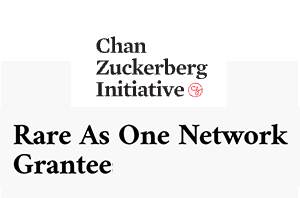Ocean City, MD — It was announced today that the Raymond A. Wood Foundation (RAWF), a patient-led, rare disease advocacy organization for survivors of hypothalamic-pituitary brain tumors, has been selected as a grantee of the Chan Zuckerberg Initiative (CZI) Rare As One Network, aimed at supporting and lifting up the work that patient communities are doing to drive progress in the fight against rare diseases.
Founded in 2017 to empower hypothalamic-pituitary brain tumor survivors with an improved quality of life by providing access to education, technology, and evolving treatments, RAWF is one of 20 organizations joining the 30 that were selected in the first cycle of this initiative. The $600,000 grant issued over a three-year period will aid RAWF and the other new recipients in: 1) advancing the development of an international, patient-led collaborative research network in their individual disease area of focus, 2) strengthening their organizational capacity, 3) convening their communities, and 4) aligning patients and researchers towards shared priorities.
Specifically, RAWF seeks to build a collective around the rare brain tumor, craniopharyngioma. This tumor — while benign — can grow and invade important structures (the closely linked hypothalamus and pituitary gland) deep within the brain that control much of the body’s function. Harvey Cushing, the ‘father of modern neurosurgery,’ actually declared it “the most formidable of intracranial tumors.” Diagnosis delays further complicate treatment, which can result in endocrine system dysfunction, challenging medical conditions, and cognitive impairment. Collaboration between patients, researchers, and clinicians is critical to opening doors for better treatment outcomes and ongoing care management.
“As a translational and clinical researcher, being able to partner with a strong advocacy organization like RAWF gives us much greater chances of success,” said Dr. Shana McCormack, Neuroendocrinologist at Children’s Hospital of Philadelphia (CHOP) and member of RAWF’s Scientific Advisory Board. “Moreover, a network of multi-disciplinary researchers ensures we will continue to advance the field together, and at an even faster pace. As part of the CZI Rare As One Network, RAWF will build even more valuable resources in service of its important mission.”
CZI recognizes that the diagnostic odyssey is a pressing challenge faced by rare disease communities as they seek to build strong, diverse, and inclusive communities, as well as move science forward towards the development of treatments and cures for all those impacted by the disease. As a result, this second cycle of funds placed additional emphasis on the potential to address diagnosis-related research challenges and the importance of addressing diversity and inclusion in those efforts.
“Having the honor to be a part of the Rare As One Network could not have happened at a better time,” said Amy Wood, RAWF Executive Director. “This will allow us to grow and strengthen our network of patients and researchers to find solutions and reach underserved populations that could likely use the resources and support we provide.”
CZI Head of Science Cori Bargmann continued, “For biomedical research in rare diseases to advance quickly and effectively, patients must be full partners with scientists and clinicians in research. We’re proud to expand our cohort of Rare As One grantees and further support the rare disease ecosystem as we work towards diagnosis, treatments, and cures together.” View the full list of grantees.
About the Raymond A. Wood Foundation
RAWF was founded by Shawn and Amy Wood after the diagnosis of their son, Alex, at age four (now eleven) with the rare brain tumor, craniopharyngioma. Emergency brain surgery to treat the tumor resulted in a host of other challenging conditions, which the Woods soon learned lacked adequate research and support. RAWF is continuing to address critical, unmet needs of hypothalamic-pituitary brain tumor survivors and their families by spearheading projects including the development of an at-home sodium meter for survivors suffering from diabetes insipidus (DI), while providing educational opportunities including a yearly Pituitary Brain Tumor Conference done in partnership with CHOP. RAWF also works to raise awareness of the lifelong challenges of these brain tumors —most recently by hosting a patient listening session with the FDA on hypothalamic obesity, one of the subsequent rare conditions that can result from these tumors — to help open pathways to treatment innovation.

